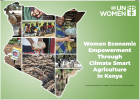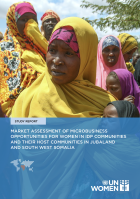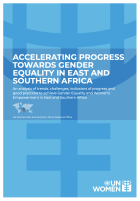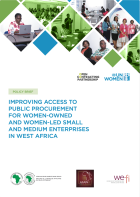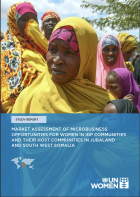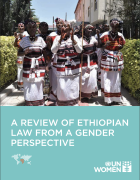1 - 13 of 13 Results
Date:
The WEE-CSA Storybook showcases the success stories of over 2,400 women from Kitui, Laikipia, and West Pokot who have transformed their lives through climate-smart agriculture. Funded by KOICA and implemented by UN Women Kenya, it highlights the project's impact on livelihoods and gender equality while sharing valuable lessons learned. This collection celebrates resilience and aims to inspire further community upliftment for sustainable development in Kenya.
Date:
The publication aims to understand the current landscape of microbusiness in terms of the opportunities, barriers and challenges that women in displacement settings face in accessing economic opportunities in the cities of Kismayo, Dollow and Baidoa
Date:
The Report highlights the imperative and urgent need to have men, along with women, become gender equality activists and work towards violence-free, inclusive societies. An important reflection on masculinity sheds light on how toxic masculinity models not only harm women and girls, but the majority of men and boys too. In this regard, gender equality really matters for both men and women, and requires both to join their efforts to realize it.
Date:
Women own 30 per cent of the small and medium businesses worldwide, yet women-owned businesses only access 1 per cent of all procurement contracts suggesting systemic gender disparities within procurement systems. This policy brief analyses the extent to and ways in which regional institutions in West Africa could adopt better policies for gender-responsive procurement.
Date:
The policy brief aims to serve as an synthesizes and presents key findings from UN Women-led research; regional online surveys and; advocacy on. making the AfCFTA work for (young) women and (young) women-led businesses, both in the design and implementation of gender-responsive AfCFTA policy reforms and complementary measures, as well as in the soon-to-be negotiated AfCFTA Protocol on Women and Youth in Trade.
Date:
Empowering women in the economy and closing gender gaps in the workspace is key to achieving the 2030 Agenda for Sustainable Development and achieving the Sustainable Development Goals in Somalia. The host community landowners and IDP casual laborers can jointly build their skills in climate-smart agriculture that can benefit the productivity of farms whilst also building the knowledge and skill set of IDPs.
Date:
The assessment offers a series of measures for re forming Ethiopian law to ensure that laws are gender sensitive and more effective at ensuring gender equal ity and non-discrimination. Most notable is that a total of 5 laws or provisions must be repealed in whole or in part; 26 laws must be revised or amended and two (2) new laws must be enacted to bring Ethiopia’s legislative framework in line with its regional and international obligations on gender equality and women’s empowerment. The report also emphasizes the need to prioritize the implementation of national laws that comply with gender equality standards, and in this context, recommends one policy measure to ensure that laws fully deliver on women’s rights
Date:
This repertoire compiles a number of Temporary Special Measures (TSMs) laws in West and Central Africa to help staff and partners to use and reflect on the available legal frameworks in the region and explore - through comparing articles and formulations -legal options that may be considered for the adoption of more favorable legal measures fostering greater gender equality in public life including in elected assemblies. View/Download : EN/FR
Date:
The African Continental Free Trade Area (AfCFTA) an opportunity for growth and prosperity in Africa. However, because of pre-existing inequalities in African economies, the agreement’s benefits will not be distributed equally along gender lines. As the AfCFTA Secretariat is starting to draft a Women in Trade Protocol, it is important that women across the continent participate actively in the process to voice their views, interests, and needs. This advocacy brief highlights 9 important...
Date:
The rapid assessment publication on Gender and Agricultural Mechanization in Ethiopia provides clear recommendations to inform the agricultural mechanization policy currently under development in the country by adding value to the process through introduction of gender responsiveness approach. The assessment also aims to strengthen enforcement of the existing agricultural mechanization by evaluating current practices in gender and mechanization in the...
Date:
Uganda strives to become a middle-income country by 2020, the Justice, Law and Order Sector (JLOS) plays a crucial role as a responsible sector for administering justice, maintaining law and order, and protecting human rights. Economic growth and transformative development can thrive, when citizens and investors have public confidence in the rule of law and justice system of the society.
Date:
UN Women East and Southern Africa continues to STEP IT UP for gender equality on a daily basis to give voice to women and girls who are still challenged with the violence, injustice, unequal opportunities and prejudices because of their gender.
Date:
In this issue : -Introduction: the gender gap in agricultural productivity -Three takeaways on the gender gap in agricultural productivity -Measuring the cost of the gender gap in agricultural productivity -Costing the factors that contribute to the gender gap in agricultural productivity -Finding the biggest bang for the buck: cost-effective policy interventions -Moving from recommendations to implementation -Appendix A: Methodology for quantifying the cost of the gender gap in...

